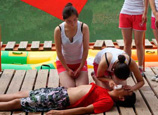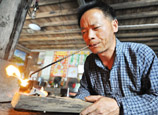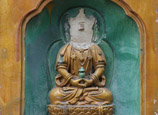
 |
| Hot-stone therapy is helpful to cure ailments such as back pain and arthritis. (China Daily) |
Several traditional therapies have embraced hot rocks for their potentially restorative powers, and spas are taking advantage of the trend, Wang Hongyi reports in Shanghai.
The summer's sizzle has already made people around the country sweaty and restless. While people are longing for the end of these hot days, experts suggest summer is the best season to discharge your body's toxins and recover your energy. According to traditional Chinese medicine, summer is the season of yang, a time when the body undergoes vigorous metabolic or body-energy processes. The yang energy is the power for viscera, integral to the function of various organs. "Traditional Chinese medicine attaches great importance to the harmony between people, environment and season. People can take advantage of this time to improve their health, and make a good preparation for next winter," says Zhang Chaoming, a TCM expert from Shanghai Landseed International Hospital.
One popular option is hot-stone massage.
Therapists use smooth, heated stones, usually basalt or river rocks, to massage certain area of the body, or place them on key points of the anatomy.
"The warmth of the hot stones will improve blood circulation and also help relax muscles, while sweating is also believed to be good for discharging the body's toxins," Zhang explains.
The therapy is gaining wide popularity among white-collar workers, who have jobs in cool air-conditioned rooms, says Fei Fei, who works with Rubis Spa in Shanghai.
She says the hot-stone therapy can be used to cure many ailments, such as back pain, osteoarthritis and arthritis pain.
Using hot stones for healing dates back to ancient times, but the modern revival of hot-stone massage is generally credited to Mary Nelson, a native of Tucson, Arizona, whose trademarked "LaStone Therapy" has a Native American spiritual component.
Variations on this style of massage have become popular in spas around the world, including in China.
"We also have special therapy for feet," says a woman surnamed Yang, a staff member at Zen Palace Massage in Shanghai. "The hot-stone therapy will help the body discharge toxins and humidity that accumulated during the last winter. We have many clients during summer, which is the best season to recuperate good body."
Almost every beauty salon has such hot-stone therapy right now, says Wang Yan, who once worked with a beauty salon in Shanghai. "But the service varies considerably in its quality."
There is a big demand for trained therapists with this skill, Wang says.
One well-known Japanese variation is called Ganbanyoku, literally translated as a bedrock bath or stone bath.
Rather than use water or steam to heat and wash the body, people simply wear a gown or something comfortable, and then lay on heated stone tablets made of granite or silica, which are warmed to around 45 C.
"The body will gradually warm up and circulation will also be improved. More sweat will come out quickly. The sweat is smooth and fresh, not smelly and sticky like that released after sports activities. Such sweat comes from the deep inside of the body," says a worker surnamed Tan at Shanghai Yishengtang, a hot-stone bath provider.
"Many clients come here to seek this detoxification effect, especially in summer," he says.
Ganbanyoku service providers claim such baths bring a number of health benefits, such as anti-aging, improved blood circulation, body detoxification and stress relief. The slimming effect of dieting can even be boosted, they say.
Compared with hot-stone therapy on the body, such a hot stone "bath" is relatively rare in China, though it can be found in some big cities like Shanghai and Beijing.
For such a spa treatment, it's necessary to rest and relax beforehand. Also, do not eat too much before the massage, Tan notes.
"Hot-stone therapy is not suitable for everyone, and it's is not recommended for people with infectious skin disease, open wounds or heart diseases. Pregnant women are also not advised to have it," he says.
"I used to feel chilly and have cold feet in winter. It's really comfortable when feeling the warmth of the hot stones, and the whole body is getting relaxed," says Sophie Chen who works with a multinational company in Shanghai.
"Sweating is a good thing. It will help release negative impurities. When I finish the whole course of a stone bath, I feel my body is cleaned up," she says.
















 Beijing, Shanghai not listed in top 10 happiest cities in China 2013
Beijing, Shanghai not listed in top 10 happiest cities in China 2013


![]()
